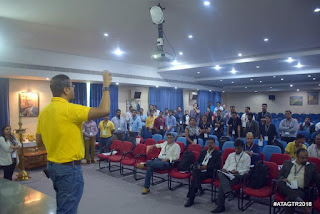With the risk of this ending up becoming a recursion, I want to share interesting statistics about my blog - essenceoftesting.blogspot.com and content shared on my SlideShare account.
Here are some charts from Analytics of my SlideShare and blog:
- First blog: Future of Test Automation Tools & Infrastructure, published on 25th Aug 2010
- Number of blogs published: 218, not counting this one
- Number of viewers: 400K+
Here are some charts from Analytics of my SlideShare and blog:
Top content from my SlideShare:
- Agile QA Process - 75K+ views, 2.75K+ downloads
- Career Path of a Tester - 1.4K views, 50 downloads
Blog Overview:
Audience:
Popular posts:
- Career Path of a Tester!
- Introducing MAD LAB - for Mobile Automation
- WAAT - Web Analytics Automation Testing Framework
- Any WAAT (Web Analytics Automation Testing Framework) users out there?
- Taking Protractor to the next level
- Features of my Android Test Automation Framework














